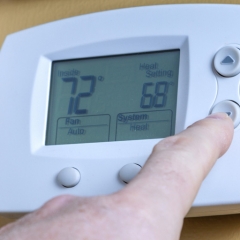Governor Kathy Hochul today announced a substantial year-over-year increase in available emergency home heating aid—with more than $90 million in federal funding available to help low- and middle-income New Yorkers avoid having their home heating disconnected or exhausting their heating source amid fuel price increases this winter. Administered by the state Office of Temporary and Disability Assistance, the Home Energy Assistance Program will begin accepting emergency benefit applications starting Monday, January 3, for those New Yorkers who have already used up their regular benefit and who are now facing a heating emergency.
“With the arrival of frigid winter weather and surging fuel prices, we must do everything in our power to safeguard vulnerable New Yorkers struggling to keep their heat on,” Governor Hochul said. “This significant increase in available emergency home heating aid represents a lifeline for tens of thousands of families. It will help them heat their homes, prevent overdue bills from piling up, and avoid the incredible stress and anxiety that can overwhelm anyone facing a heating emergency.”
The emergency benefit amount per household has been increased by at least 32 percent, and upward of 42 percent, depending on the type of heating fuel used for the household. A home heated with natural gas will now be eligible for $465, a 32.8 percent increase over last year’s benefit; while a home using oil, kerosene or propane will be eligible for a $965, a 42.9 percent increase over the prior year.
Office of Temporary Disability Assistance Executive Deputy Commissioner Barbara C. Guinn said, “Far too many New Yorkers struggle to make ends meet as the cold-weather months continue. And with the pronounced increases in heating utility expenses, this year will be no exception. HEAP’s emergency benefit provides a timely stop-gap for those households that are falling behind on their heating bills or are at-risk of exhausting their heating fuel supply so that they can continue warming their homes through the winter.”
Department of Public Service CEO Rory M. Christian said, “I applaud Governor Hochul’s leadership in addressing the need of so many consumers to light their homes and keep the homes warm this winter. The Department of Public Service actively works with utilities in New York State to ensure that consumers are aware of ways to reduce their energy bills. Further, we are closely monitoring utilities to ensure they are offering all possible consumer protections so service continues without interruption during the cold winter months.”
During the fall, the New York Public Service Commission forecast that electric and natural gas bills will be significantly higher for the 2021-2022 winter season, with natural gas projected to increase by an average of about 21 percent statewide. The cost of propane has also increased about 30 percent since last winter, according to the New York State Energy Research and Development Authority.
To be eligible for the emergency benefit, an income qualifying household must be facing a heating utility shutoff, or electric utility service disconnection if it is necessary to operate the primary heating equipment. Also qualified for the benefit are those households that have exhausted their heating fuel supply or have less than one quarter tank of oil, kerosene, or propane; or have less than a 10-day supply of other heating fuels.
Applications for assistance are accepted at local departments of social services in person or by telephone, with funding provided on a first-come, first-served basis. A list of local offices by county can be found here. Residents outside of New York City may also apply online for regular heating assistance benefits. New York City residents may download an application and obtain program information here.
Last year, the heating emergency benefit provided critical assistance to more than 111,000 New Yorkers. In total, OTDA distributed roughly $65 million in emergency heating assistance during the 2020-2021 winter season.
OTDA also continues to take applications for the regular arrears supplement, which is providing $150 million in federal funding to help HEAP-eligible households pay heating utility arrears. The one-time payments will cover all accumulated heating utility arrears up to $10,000 per household, with requests for assistance accepted at local departments of social services in person or by telephone.
Help is also available to assist eligible homeowners if their primary heating equipment is unsafe or not operating and their furnace or boiler must be repaired or replaced. Benefit amounts through the HEAP Heating Equipment Repair and Replacement program are based on the actual cost incurred to repair or replace the essential heating equipment—up to $3,000 for a repair and $6,500 for a replacement.
Eligible homeowners can also apply for a HEAP Heating Equipment Clean and Tune benefit to keep their home’s primary heating source working at peak efficiency. Applicants for these benefits should contact their local department of social services for more information.
To qualify for these federally funded programs, applicants must meet HEAP eligibility criteria and income guidelines, which vary by household size. For instance, a family of four may have a maximum gross monthly income of $5,249 or an annual gross income of $62,983.

